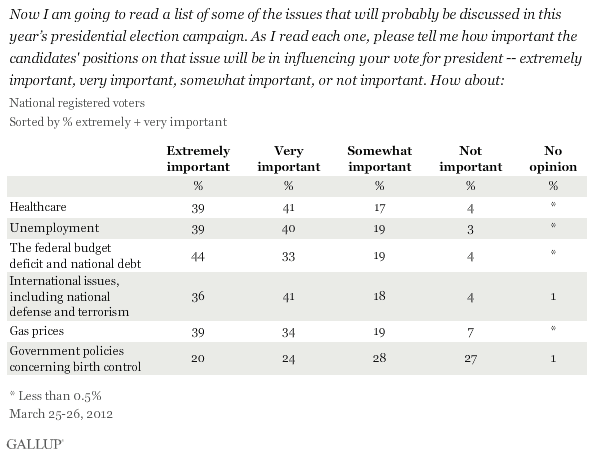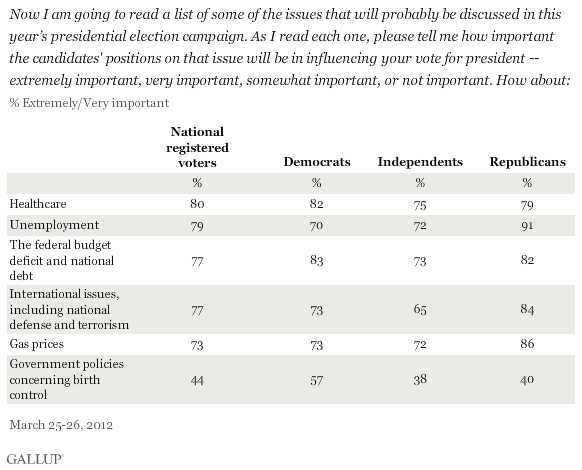PRINCETON, NJ -- Most voters in the United States say issues such as healthcare, unemployment, the federal deficit, international issues, and gas prices are important to their presidential vote, but less than half say the same about federal birth control policies.

The government's policies on birth control have received a great deal of visibility in recent months as part of a dispute over the Affordable Care Act's provisions requiring some religious institutions to offer birth control as part of their health insurance plans. Republican presidential candidates and Catholic leaders have criticized the provision, while President Obama has defended it, albeit while making some adjustments designed to make it more palatable to Catholic institutions.
The 44% of registered voters who say that federal government policies on birth control will be important to their vote is substantially lower than the 73% to 80% of voters who say that about the five other issues tested in the poll.
Democrats are significantly more likely than independents or Republicans to say birth control policies will be important to their vote, but even among Democrats, the issue comes in last on the list.

These partisan differences could be partly due to the gender gap in partisan identification. Women are more likely than men to identify as Democrats, and women voters, by a 20-percentage-point margin, 55% to 35%, are significantly more likely than men to rate government policies relating to birth control as important. The higher level of importance for this issue among women could reflect the fundamental facts regarding women's relationship to pregnancy and birth, as well as their reactions to the recent controversy.
The relatively low importance voters assign to government policies on birth control is accompanied by a low level of public knowledge of presidential candidates' positions on the issue. When asked if they agree or disagree with the birth control policies espoused by Barack Obama, Mitt Romney, or Rick Santorum, relatively few voters indicate they know enough to say.
More precisely, 54% of voters offer an opinion, either positive or negative, on Obama's position on birth control, 44% have an opinion on Santorum's position, and 35% an opinion on Romney's position. The slightly higher percentage who have an opinion about Santorum's compared with Romney's position on this issue may reflect the former's high-visibility campaign focus on this and other values issues. Such positions have been instrumental in gaining him support among highly religious Republican voters and in his victories in more conservative Southern state primaries so far this year.
![From what you know or have read, do you agree or disagree with the views of [RANDOM ORDER] on the issue of government policies concerning birth control, or don’t you know enough to say? Among national registered voters and by party ID, March 2012](http://content.gallup.com/origin/gallupinc/GallupSpaces/Production/Cms/POLL/k-jbysjhe0y1as5yfereeq.gif)
Those who do have an opinion about Obama's position on government policies and birth control split almost evenly between agreement and disagreement. The smaller groups with an opinion on Santorum's or Romney's positions, on the other hand, are more negative than positive. This suggests that the controversy has likely hurt Republicans.
Views of Obama's position are distributed roughly equally along partisan lines, with about half of Democrats agreeing, about half of Republicans disagreeing, and independents evenly split. For the two Republican candidates, however, Republican agreement does not match Democratic and independent disagreement, yielding the overall net negative results.
Implications
In general this year, voters give values issues a low priority when contrasted with the more dominant issues relating to the economy. The finding that voters place the controversial issue of federal policies about birth control well below economic, healthcare, and international issues confirms this basic fact of political life. Family values issues may be of paramount importance to some smaller segments of the population -- one of a number of so-called niche issues -- but birth control will clearly not be voters' main focus in this campaign.
Survey Methods
Results for this USA Today/Gallup poll are based on telephone interviews conducted March 25-26, 2012, on the Gallup Daily tracking survey, with a random sample of 901 registered voters, aged 18 and older, living in all 50 U.S. states and the District of Columbia.
For results based on the total sample of registered voters, one can say with 95% confidence that the maximum margin of sampling error is ±4 percentage points.
Interviews are conducted with respondents on landline telephones and cellular phones, with interviews conducted in Spanish for respondents who are primarily Spanish-speaking. Each sample includes a minimum quota of 400 cell phone respondents and 600 landline respondents per 1,000 national adults, with additional minimum quotas among landline respondents by region. Landline telephone numbers are chosen at random among listed telephone numbers. Cell phone numbers are selected using random-digit-dial methods. Landline respondents are chosen at random within each household on the basis of which member had the most recent birthday.
Samples are weighted by gender, age, race, Hispanic ethnicity, education, region, adults in the household, and phone status (cell phone only/landline only/both, cell phone mostly, and having an unlisted landline number). Demographic weighting targets are based on the March 2011 Current Population Survey figures for the aged 18 and older non-institutionalized population living in U.S. telephone households. All reported margins of sampling error include the computed design effects for weighting and sample design.
In addition to sampling error, question wording and practical difficulties in conducting surveys can introduce error or bias into the findings of public opinion polls.
View methodology, full question results, and trend data.
For more details on Gallup's polling methodology, visit www.gallup.com.
